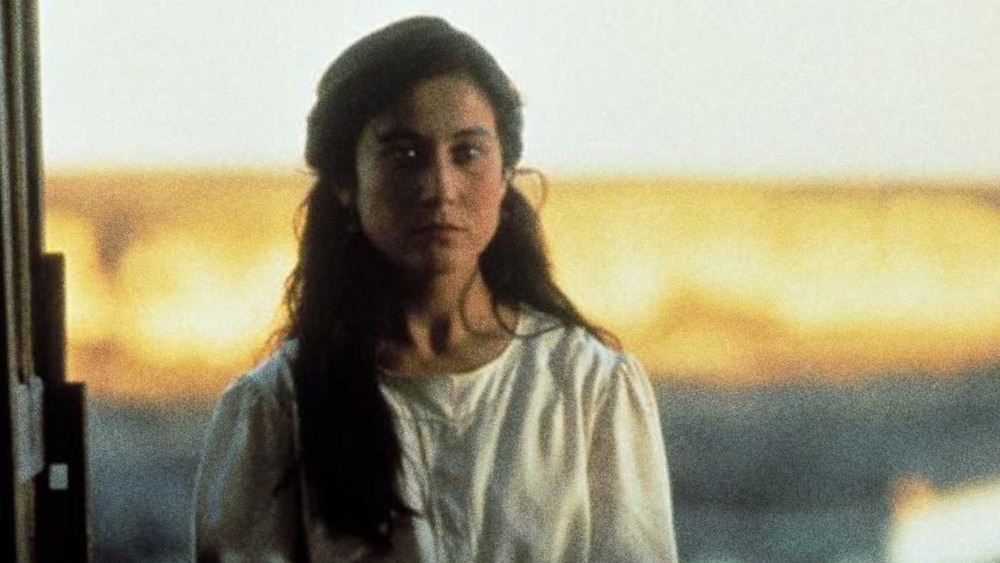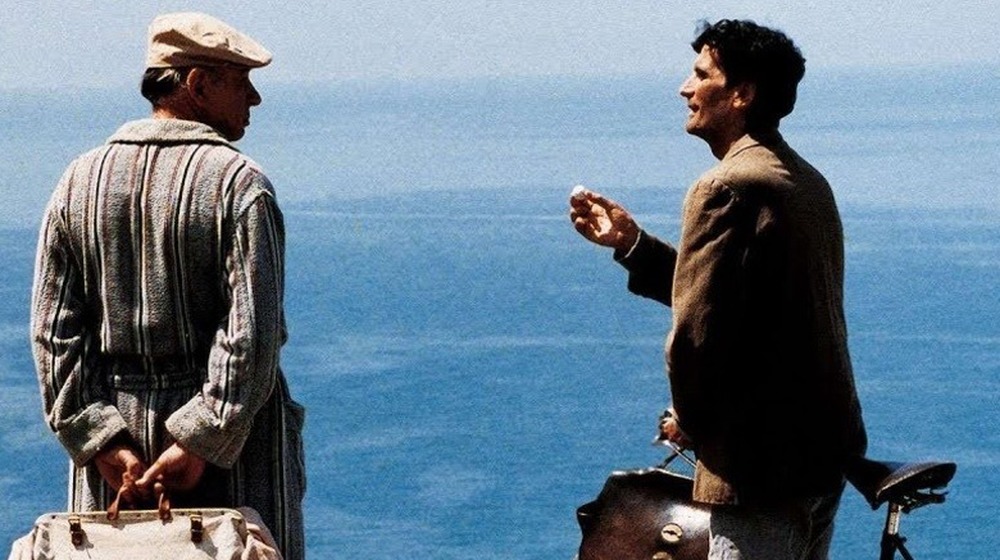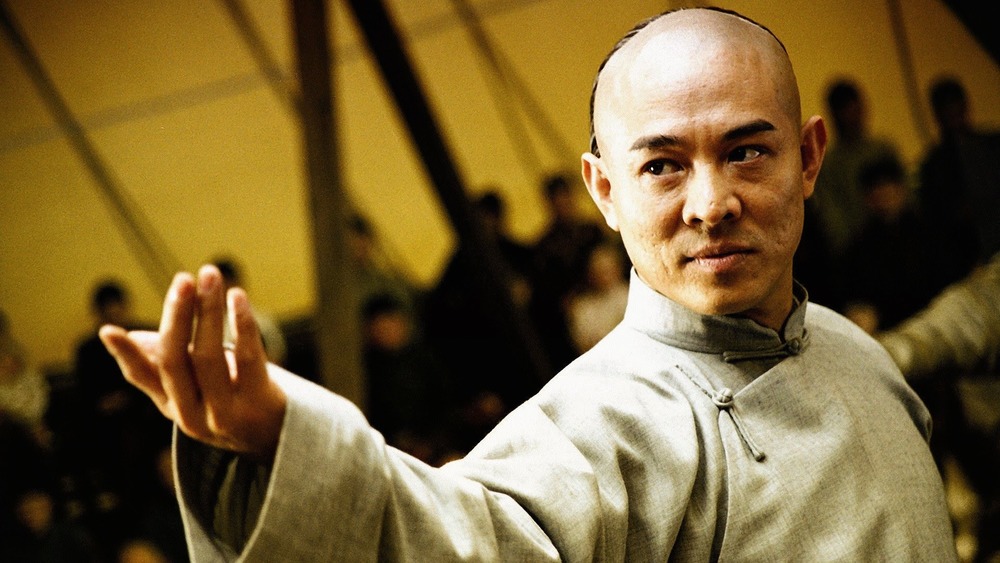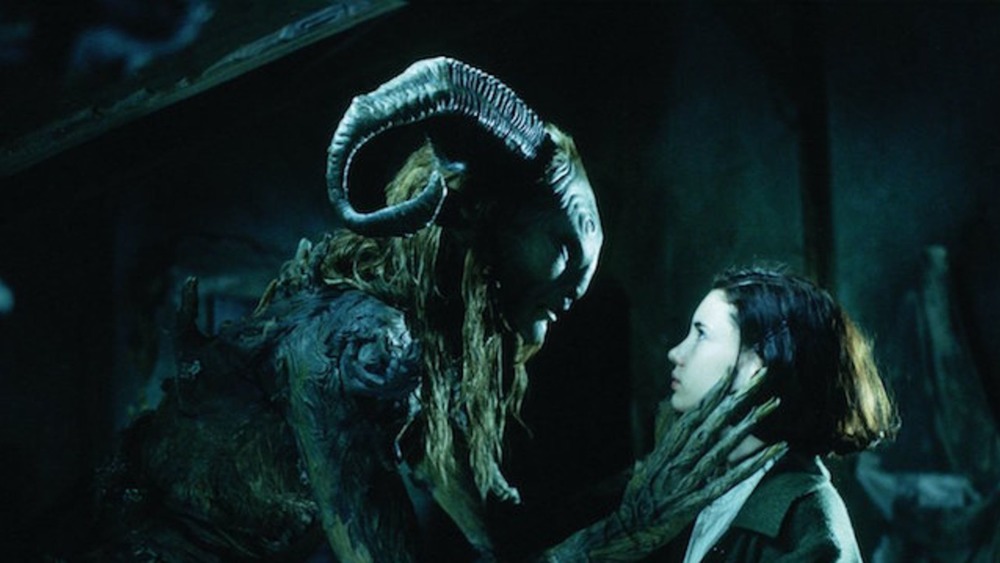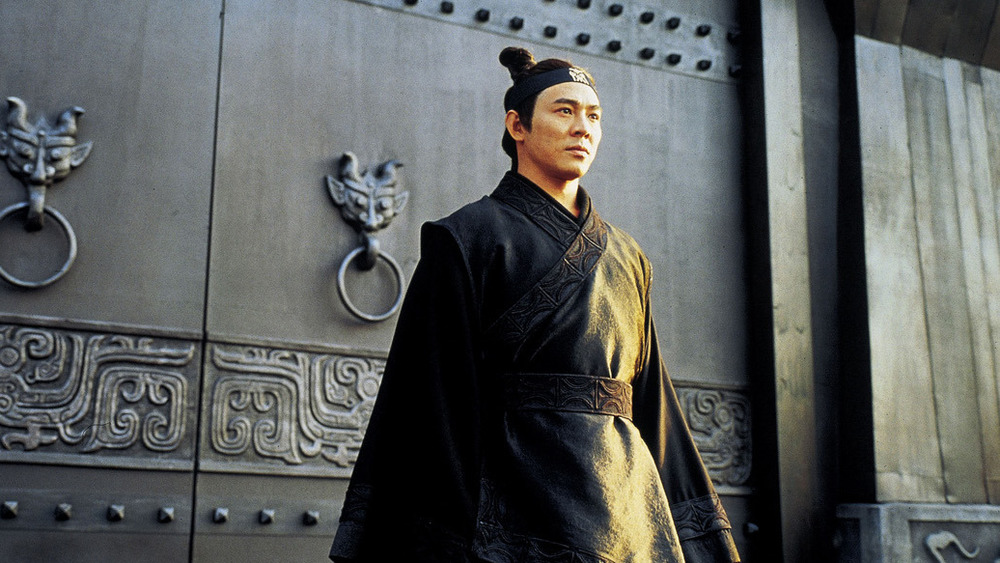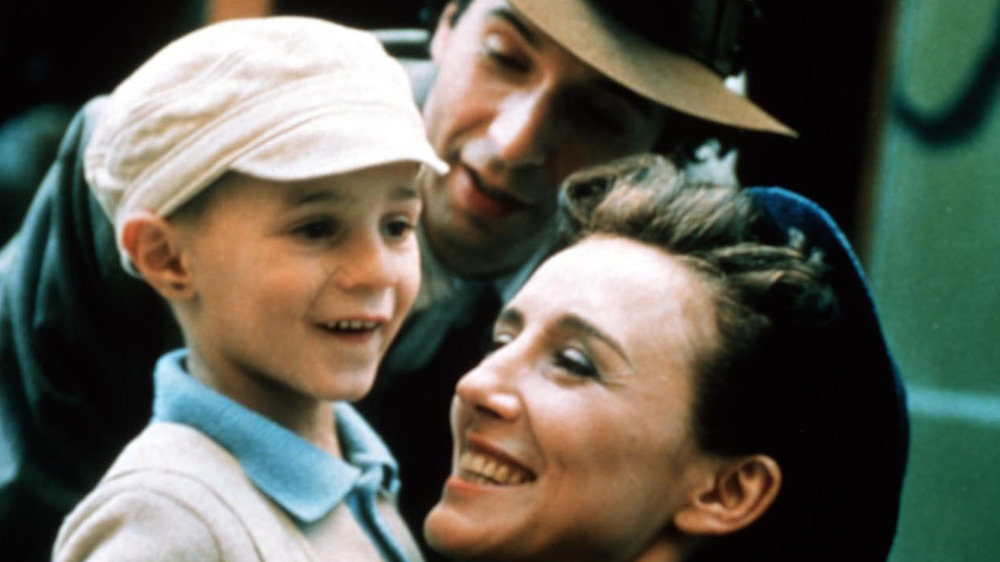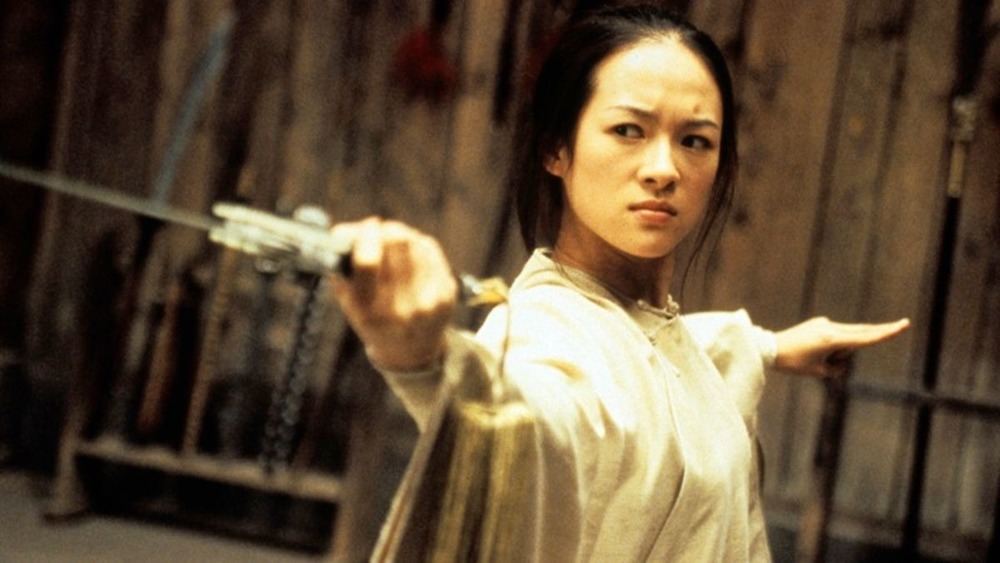These Are The Highest-Grossing Foreign-Language Films In The U.S.
Conventional wisdom suggests that American moviegoers just aren't interested in foreign-language films. The majority of the domestic population evidently can't clear the hurdle of the "one-inch-tall barrier of subtitles" (as Parasite director Bong Joon-ho put it). As a result, foreign-language movies have been relegated almost exclusively to arthouse cinemas where their chances of scoring big-time success are minimal. But while they may be widely perceived as existing for a niche audience, the domestic box office history of foreign-language films actually suggests these movies have a much wider than expected appeal.
Granted, when it comes to distribution, the present-day circumstances for foreign-language films are far from ideal. After all, the Hollywood studios that most invested in foreign-language fare (Miramax, namely) have vanished, while modern arthouse studios (like A24) have mostly ignored foreign-language titles. In the process, there have been few chances for foreign films to break out, and as a result, this creates the idea that these titles have limited appeal in the U.S. So, when one of these films does manage to make it to American shores and do big business at the box office, that's especially impressive.
And today, we're here to celebrate these moneymakers, the films that serve as reminders that American moviegoers are just as interested in these titles as any other type of cinema. From Mexican romances and Korean thrillers to epic Chinese action flicks, these are the highest-grossing foreign-language films in the U.S.
Like Water for Chocolate was a delectable treat for moviegoers
"The truth doesn't exist. It depends on many things," opines Gertrudis (Claudette Maille) at one point during Like Water for Chocolate. While that may be accurate in some contexts, one objective truth is that Like Water for Chocolate turned out to be a smash hit domestically. Hailing from Mexico and debuting in 1993, this Alfonso Arau directorial effort tells the tale of a woman caught in a complicated love triangle and how she expresses her emotions through cooking incredible dishes. This magical realist film exceeded expectations thanks to a wave of awards-season buzz, immensely positive reviews from critics, and the concurrent popularity of its source material, the 1989 novel by Laura Esquivel.
By the time it hit $13 million domestically, Like Water for Chocolate had already become the highest-grossing foreign-language movie in 14 years. Its box office feats didn't stop there thanks to it grossing a total of $21.6 million by the time its domestic run was finished. That made Like Water for Chocolate the highest-grossing foreign-language film domestically up to that point. The fact that neither the film's cast nor director were household names in North America made this box office performance outright outstanding. Perhaps sometimes "the truth doesn't exist," but here, the truth that Like Water for Chocolate was a box office success is readily apparent.
Il Postino: The Postman delivered a robust box office
Summertime is usually the place for mindless action movies. The summer of 1995 was no exception. Between Batman Forever, Congo, and Judge Dredd, this season was full of films heavy on explosions but low on intellect. Sometimes, though, an arthouse movie manages to break through all that noise and become a hit. So it was in '95 with Il Postino: The Postman, an Italian dramedy that told the story of a mailman who befriends a poet and then begins writing poetry himself to impress a beautiful woman. And this foreign feature managed to slowly but surely accumulate an impressive haul at the domestic box office.
Debuting with $95,310 from ten theaters in June 1995, Il Postino: The Postman posted a respectable opening weekend. At this juncture, the film appeared poised for a run that would be commendable but nothing to write home about. That perception would eventually change because Il Postino's box office run was far from over once its opening weekend was finished. This feel-good film kept on attracting moviegoers well after the summer of 1995 was through. By the time February 1996 arrived, Il Postino had managed to stick around long enough to gross $10.6 million.
And the film's theatrical run wasn't over yet thanks to it scoring an impressive slew of Academy Award nominations in categories like Best Actor, Best Director, and Best Picture. Eventually, Il Postino: The Postman would ride a wave of awards-season buzz to a $21.8 million domestic haul. In the process, it proved that not all box office hits launching in the summertime have to be all about the action.
Fearless battled its way to an impressive $24.6 million
In some respects, Jet Li's Fearless wasn't quite as formidable of a box office opponent as many expected. For one thing, it was outgrossed in its opening weekend by the low-budget comedy Jackass: Number Two. Apparently, the star power of Jet Li was no match for the sight of Johnny Knoxville placing his hand inside a bear trap. For another thing, it came in beneath the domestic box office grosses of past Jet Li vehicles. Still, by most measures, particularly in regards to how most foreign-language movies fare at the box office, Fearless was a solid box office performer.
As for the plot, this Chinese classic tells the story of Huo Yuanjia, a real-life martial artist who defended Chinese pride by challenging and defeating foreign fighters. And in its domestic run, Fearless grossed $24.6 million. Granted, that was beneath the domestic cume of Li's Hero from just two years prior, as well as other Li vehicles like Cradle 2 the Grave, but Fearless did go out in fewer theaters than those titles. It also didn't open over a holiday weekend like Hero did, and it was distributed by Rogue Pictures, which had far less experience releasing foreign-language films than Hero's distributor, Miramax.
While it may not have been a breakout hit like past Li films, Fearless still fought its way to a significantly bigger than usual domestic gross for a foreign-language title. Plus, like with any Li movie, the domestic box office intake was just one part of the story for Fearless. The sizeable box office cume in Li's home country of China made the domestic performance of Fearless financial gravy.
Amelie cast a spell over the box office
Sometimes, to lure moviegoers into theaters, you need unparalleled spectacle. Only the biggest visual effects and the most elaborate stunts will do when enticing people to see your movie on the big screen. Other times, though, what makes your movie a must-see can be something much more simple, like a well-meaning French girl with a buoyant smile. Such was the case with Amelie – the tale of lonely waitress who secretly makes people happy via incredibly intricate plots — which rode on its feel-good atmosphere and helpful lead character to domestic box office success.
Debuting domestically in the first weekend of November 2001, Amelie got off to a rousing $136,470 start, and it didn't let up from there. Over the various holiday weekends in the following two months, domestic moviegoers began flocking to see Amelie. At the start of 2002, Amelie had already grossed $15.7 million domestically without ever expanding its theater count beyond 232 locations. Such an impressive feat meant Amelie began nabbing headlines for its strong U.S. box office performance, a feat BBC chalked up to the praise it was receiving from audiences and award ceremonies like the Golden Globes. Everybody, both casual moviegoers and prestige critics alike, couldn't get enough of Amelie.
Eventually, Amelie grossed $33.2 million domestically, a sum far above initial expectations and 20% of Amelie's record-breaking $174 million worldwide gross. Rarely do French movies achieve such notable box office, but then again, rarely do movies of any kind have an upbeat of a protagonist as Amelie.
Audiences got lost in Pan's Labyrinth
In the modern world, Pan's Labyrinth has become a ubiquitous sight in the pop culture scene. The film introduced U.S. audiences to Guillermo del Toro's trademark visual style, and since then, images of the Pale Man and the Faun have been widely used across the internet. Heck, the movie even helped normalize the idea of darker live-action fantasy films in the mainstream scene.
Initially, though, it didn't seem like Pan's Labyrinth had much of a chance of making an impact domestically. Not only did foreign-language movies rarely make a splash at the domestic box office, but the film's North American distributor, Picturehouse, didn't have a great box office track record. But Pan's Labyrinth beat the odds to score a happy ending at the box office worthy of the fairy tales it was paying homage to.
Debuting in limited release in the last days of 2006, Pan's Labyrinth was a great example of a movie that played slow and steady. Though it never made more than $4.7 million over a single weekend, Del Toro's unique and affectionate ode to fairy tales kept on generating conversation in the early months of 2007. Through this strong word-of-mouth, it managed to crack $37.6 million at the domestic box office. That made it the highest-grossing movie ever from Picturehouse by a considerable margin. It also showed that del Toro didn't need the brand names of Hellboy or Blade to make a domestic hit.
Instructions Not Included laughed all the way to the bank
By the time Instructions Not Included arrived in August 2013, the production company Pantelion Films had delivered its fair share of broad comedies, all of them aimed at Latinx audiences. However, the likes of From Prada to Nada and Casa de Mi Padre hadn't set the box office on fire. That all changed with Instructions Not Included, a comedy that decimated all expectations in its theatrical run.
The film's opening weekend alone was the biggest domestic debut ever for a Spanish-language film, per Entertainment Weekly, and a major breakthrough for leading man Eugenio Derbez in the domestic marketplace. Instruction Not Included's gags stemming from a premise concerning a dad having to raise a daughter he never knew he had were so widely appealing that its impressive financial achievements didn't stop at the film's opening weekend.
By the end of September 2013, Instructions Not Included had held on at the box office with enough to strength to surpass the domestic haul of Pan's Labyrinth. In the process, it had become the highest-grossing Spanish-language film in history at the domestic box office. By the end of its run, the comedy had grossed $44.4 million domestically – far and away the biggest haul Pantelion had ever seen for one of its titles — and it proved that different kinds of comedies could have successful box office runs in the U.S.
Parasite shattered all expectations for foreign-language films
In 2014, Bong Joon-ho's initial attempt at breaking through at the American box office was scuttled. The 2014 feature, Snowpiercer – his first foray into English-language cinema– had special effects-laden set pieces and a Marvel superhero (Chris Evans) in the lead role. Though it was primed for box office success, conflicts with producer Harvey Weinstein complicated Snowpiercer's release. Eventually, Snowpiercer, despite getting some of the best reviews of any movie in 2014, was dumped into just a handful of theaters in June 2014.
Bong Joon-ho eventually secured the level of domestic box office success that Snowpiercer was prevented from reaching with his 2019 film, Parasite. A South Korean thriller about a rich family and a poor family coming into conflict, Parasite started off with a bang in its limited release debut and just kept hanging on as the months went by. As it accumulated more and more groundbreaking award wins at prestigious ceremonies like the Golden Globes and the Screen Actors Guild Awards, so too did Parasite's domestic box office haul climb. Demand soon became so high for the film that it scored a limited IMAX release four months into its domestic run, an unheard of development for foreign-language films in the domestic market.
Eventually, Parasite managed to secure a domestic gross of $53.4 million, well beyond anything else in Joon-ho's filmography and by far the largest domestic haul for any South Korean film. It may have taken him a few extra years, but Bong Joon-ho eventually found enormous domestic box office success (and quite a few Academy Awards).
Jet Li fought his way to the top with Hero
Foreign-language movies usually follow a familiar release pattern in their domestic debuts. They premiere in a handful of theaters (usually as few as three or four), then gradually expand in the weeks ahead into other major areas while, ideally, riding a wave of positive word-of-mouth. But around August 2004, Jet Li was enough of a box office draw that his film Hero was able to eschew this trend. Hero, like most English-language action movies, debuted domestically in wide release right away. Opening in 2,031 locations on its opening weekend, this strategy indicated that distributor Miramax had major hopes for Hero's domestic box office performance.
Those hopes turned out to be well placed. With its twisty tale of intrigue, assassins, and swordfights (along with some truly beautiful imagery), Hero opened atop the domestic box office with $18 million — the biggest domestic opening weekend in history for a foreign-language title. After such an impressive bow, Hero didn't stop its noteworthy box office run there, thanks to its lifetime domestic box office haul of $53.7 million. That makes Hero the 24th biggest movie ever for Miramax among their library of nearly 400 titles, as well as the second-biggest Jet Li star vehicle of all-time, only behind his 2000 English-language feature, Romeo Must Die.
It was also another reminder that subtitles won't immediately drive away Western moviegoers from seeing foreign-language action movies. So long as the action is solid, domestic audiences will turn up in strong enough numbers for films like Hero to justify an immediate wide release.
Life is Beautiful had a gorgeous box office run
Today, Life is Beautiful is mostly remembered for when the film's leading man, Roberto Benigni, won an Oscar for Best Actor. To get to the stage to accept the award, Benigni took the unorthodox route of hopping on top of the seats in the Dolby Auditorium. It was a sight to behold on live television, all these mega-famous stars being trampled on by Roberto Benigni. Of course, almost as notable in regards to Italy's Life is Beautiful is the film's impressive domestic box office performance.
That performance is particularly exemplary when remembering that, prior to that unforgettable demonstration at the Oscars, North American audiences weren't generally familiar with Roberto Benigni. Then there was its bold premise involving the Holocaust, which was deemed inappropriate in some corners. But the hopeful comedy used its uplifting spirit to charm domestic moviegoers and overcome its lack of star power.
That spirit spread around gradually as, for the first 16 weeks of its domestic box office performance, Life is Beautiful kept its theater count modest by staying in limited release. Though it wasn't playing in thousands of theaters, Life is Beautiful managed to gross $18 million before it even went into wide release. Thanks to a subsequent expansion into wide release and several high-profile Oscars wins, Life is Beautiful was able to make $57.5 million, a sizeable haul worthy of some oversized celebrating, like, say, racing across rows of chairs.
Ang Lee's Crouching Tiger, Hidden Dragon was a historic foreign-language hit
In the history of the domestic box office, only one foreign-language movie has cracked $100 million domestically. Such a momentous honor goes to none other than Ang Lee's 2000 feature Crouching Tiger, Hidden Dragon. A film hailing from Taiwan told entirely in Mandarin, Crouching Tiger, Hidden Dragon wasn't just a sleeper hit on the arthouse theater circuit. It broke into the mainstream to such a profound degree that it grossed $128 million domestically, a large enough sum to make it the 12th biggest movie of 2000 at the domestic box office.
In addition to still being Sony Pictures Classics' biggest movie ever, Crouching Tiger, Hidden Dragon stands as Lee's second-biggest movie domestically, only behind his 2003 superhero movie Hulk. Crouching Tiger, Hidden Dragon managed to become such a massive hit thanks to what Christine Klein of Yale University dubbed the "simultaneously local and global nature of Crouching Tiger." In other words, while rooted in elements distinct to traditional Chinese cinema, the film's sweeping story of love, revenge, and action was universal in its appeal.
Like so many domestically lucrative foreign-language movies, Crouching Tiger also got a boost in its box office performance by obtaining a number of prolific Oscar nominations, including one for Best Picture. With all these factors at its back, it's no wonder Crouching Tiger, Hidden Dragon soared above all other foreign-language films at the domestic box office.

